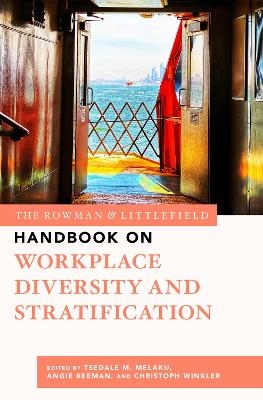
The Rowman & Littlefield Handbook on Workplace Diversity and Stratification
Rowman & Littlefield (Verlag)
978-1-5381-4437-4 (ISBN)
Timeliness and Importance
Diversity and Inclusion has become a key catchphrase in every organization and institution, ranging from corporations, academic institutions, political machines and more. Marketing tools and promotional selling points often invoke the relevance of diversity and inclusion as a means of signaling opportunity and access for all. However, even with the overuse of diversity and inclusion mantras there often lies its underwhelming results. The growing rates of diversity and inclusion requirements within institutional practices suggests that diversity and inclusion will not fade into the background. People are demanding that organizations be held accountable to the diversity and inclusion mission statements on their websites. This proposed handbook is timely because there is a growing demand for diversity to become more than a buzzword, to understand the value that diversity brings and find concrete ways of developing policies and practices that will make diversity an intrinsic part of any organizational culture. This academic handbook will be a rich and valuable resource for researchers, undergraduate and graduate students, company leadership and boards, clients, customers, and anyone interested in understanding what workplace diversity and stratification mean for everyday people, institutions, and society as a whole and how to endeavor towards reaching that goal.
Tsedale M. Melaku, PhD is a Sociologist, Assistant Professor of Management at the Zicklin School of Business, Baruch College (CUNY), and author of You Don't Look Like a Lawyer: Black Women and Systemic Gendered Racism, which reflects the emphasis of her scholarly interests on race, gender, class, workplace inequities, intersectionality, and organizations. Her interdisciplinary research on women in the workplace unites three strands of significant sociological and management inquiry: diversity in the workplace, women in leadership positions, and the impact of systemic racism on advancement opportunities. Her research is published in peer-reviewed journals such as Gender, Work & Organizations, American Behavioral Scientist, and Ethnic and Racial Studies. Dr. Melaku’s recent book and her cutting-edge articles have garnered international attention, with features in the Harvard Business Review, New York Times, The Washington Post, Bloomberg Law, CBSNews, TODAY Show, Inside Higher Ed, The Boston Globe, Forbes, Fortune, Teen Vogue, and various other outlets. Angie Beeman, PhD is an Associate Professor in the Marxe School of Public and International Affairs at Baruch College. Her research examines changing expressions of racism and how this affects interracial organizing, progressive politics, and workplace equity. Dr. Beeman's research has appeared in the Harvard Business Review, Forbes Magazine, The Wire, Counterpunch, Sociological Forum, Gender, Work, and Organization, and Ethnic and Racial Studies and as chapters in several edited volumes. In addition to these publications, she has been quoted in Nature Journal, Diverse: Issues in Higher Education, Galveston Daily News, and WalletHub. Dr. Beeman has shared her work with multiple audiences and is frequently invited by organizations to speak on the issues of racism, social justice, and cultivating inclusiveness in the workplace. She has appeared on CSPAN's Washington Journal, Connecticut Public Television, Historic Mitchelville Freedom Park, and was a featured speaker for the Diversity and Inclusion Research Conference (DIRC) as well as for NASA, the Association of Junior Leagues International and Network of Executive Women. Her book, Liberal White Supremacy: How Progressives Silence Racial and Class Oppression examines divides among progressives and the role of liberal ideology in preventing significant change. In this book, she distinguishes between liberal and radical approaches to racism, working class issues, racial capitalism, and social movement tactics using theoretical insights and empirical evidence to advances practical applications of what she calls "racism-centered intersectionality." Christoph Winkler, PhD is the endowed professor and founding program director of the Hynes Institute for Entrepreneurship & Innovation at Iona University, which immerses students in an interdisciplinary community of creativity, innovation and personal growth. As a well-respected leader in entrepreneurship education, Dr. Winkler has been pushing boundaries and re-envisioning traditional academic practices in higher education. He presently serves on the co- executive editor of the journal Entrepreneurship Education and Pedagogy (EE&P), as well as the director of the Doctoral Consortium for Teaching and Learning of the United States Association for Small Business and Entrepreneurship® (USASBE), playing a pivotal role in advancing the field of entrepreneurship education. Dr. Winkler’s work has been published in leading outlets such as the Harvard Business Review, Journal of Small Business Management, Entrepreneurship & Regional Development, Entrepreneurship Research Journal, and Entrepreneurship Education & Pedagogy.
Outline/Table of Contents
Foreword
Introduction: The introduction will lay out the goals of the handbook; situate the context of workplace diversity and stratification in the United States; and provide a broad overview of the contents of the handbook
Theoretical Foundations of Diversity and Stratification
The following chapters specifically engage theories derived from various discipline research on diversity and stratification, including race/gender/class/ and how varying identities that intersect create disadvantage or advantage to particular groups.
Critical Diversity Perspective: this perspective examines all forms of social inequality, oppression, and stratification that revolve around issues of differences
Race, Gender & Authority in the Workplace: sociological approaches to job authority in determining social inequality in the workplace
A Psychological Perspective: conceptualizing workplace diversity through stigma theory and research in order to social value and attributes which become consequential to both individuals and organizations
A Business Management Perspective: social capital and social network theories in examining diversity and productivity in business management
Key Sites of Contention
The following chapters will tackle specific issues in diversity research, from debates on inclusion, quotas, race/ethnicity, gender, age, ability, language/culture, and sexual identity.
Diversity: A Culture of Inclusion?: understanding what diversity research actually is and how inclusion becomes the central focus in promoting integrated practices within organizations; defining diversity and inclusion as more than a buzzword
The Problem with Quotas: Doing the Bare Minimum to Achieve Diversity: efficacy of best practices or policies (i.e. affirmative action) to promote diversity in workplaces
Managing workplace Diversity: The Role of Race in America: social policies designed to increase equality of opportunity in the workplace; managerial responses to diversity, ethnoracial and gender stratification at work, the determinants of and rewards for job authority, effects of diversity on work outcomes
Gender Parity in the Boardroom: examination of how gender diversity on corporate boards influence corporate governance outcomes that subsequently impact performance
Bridging the Gap Between Generations: Value in Difference: examining the multiplicative effects of workplace discrimination and health on life satisfaction
Equitable Accommodations: Challenges Employees with Physical and Mental Disabilities Face: exploration of the ways in which employees with physical and or mental disabilities face continued challenges navigating space and access within organizations
LGBTQ+ Diversity: Language and Communication: this chapter will explore the usage of language to communicate difference in gender and sexuality within professional organizations, including challenges LGBTQ+ members face attempting to bring their whole selves to work; and combating unconscious bias
Empirical Diversity/Stratification Studies
The following chapters will engage various studies that examine diversity in specific professional settings, including education, medicine, law, corporations, religious institutions, entrepreneurship, and human resources research
Faculty of Color in Higher Education: examining the challenges faculty of color in higher educational institutions, including hiring, review processes and tenure and promotion
Black Medical Professionals: intersection of race, gender, work, and inequality in the medical field
Diversity in Law Firms: influence of race and gender on advancement prospects of lawyers in elite firms
Corporations: Gender Equity and Mentorship: obstacles women face in corporations securing mentors and sponsors in the workplace
Black Women in the Church: this chapter will discuss how Black women today navigate the male-dominated space of professional ministry
Entrepreneurship and Diversity: this chapter examines issues, challenges and opportunities related to diversity within entrepreneurship ecosystems
Human Resources and the Impact of Diversity: exploring the impacts felt by organizations that understand the importance of not just espousing the notion of diversity but enacting the principles; how organizations will respond to the satisfaction of their market that has become increasingly stratified; and are the choices of diversity and stratification mutually exclusive for those focused on viability as long-term concern
Diversity in the Larger Context
The following chapters will discuss diversity and inclusion in the broader context of organizational practices, effectiveness of policies and programs, implications for workplace changes and value derived
Mitigating Bias in the Workplace: this chapter will focus on reducing discrimination in the workplace
Organizational Effectiveness: developing organizational capability and enhancing effectiveness through the strategic management of people, particularly diverse work teams
Implications of Diversity and Inclusion in the Workplace: this chapter will explore exactly what the benefits and drawbacks of having diversity and inclusion initiatives in organizations, exploring the effectiveness of programs
The Meaning of Diversity in the Workplace: the value of diversity, how this affects the organization as a whole, who/how do organizations benefit from diversity; expectations of the organization (Does Diversity Pay?)
| Erscheinungsdatum | 26.09.2023 |
|---|---|
| Reihe/Serie | The Rowman & Littlefield Handbook Series |
| Verlagsort | Lanham, MD |
| Sprache | englisch |
| Maße | 183 x 262 mm |
| Gewicht | 1234 g |
| Themenwelt | Sozialwissenschaften ► Ethnologie |
| Sozialwissenschaften ► Soziologie | |
| ISBN-10 | 1-5381-4437-9 / 1538144379 |
| ISBN-13 | 978-1-5381-4437-4 / 9781538144374 |
| Zustand | Neuware |
| Haben Sie eine Frage zum Produkt? |
aus dem Bereich


